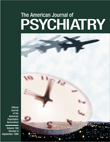Association Between Novelty Seeking and the Type 4 Dopamine Receptor Gene in a Large Finnish Cohort Sample
Abstract
OBJECTIVE: An association between the type 4 dopamine receptor (DRD4) gene and the behavioral trait of novelty seeking has been reported, but several studies have failed to replicate this finding. In the present study, the authors tested for this association in a representative sample from the Finnish population. METHOD: The authors administered the Temperament and Character Inventory to 4,773 individuals from the 1966 birth cohort of northern Finland. They then genotyped 190 subjects with extreme scores for a 48 base-pair repeat polymorphism in the DRD4 gene. RESULTS: There was a significant difference in allele frequencies between the two groups. The 2- and 5-repeat alleles were significantly more common in the group of high scorers than in the group of low scorers. CONCLUSIONS: These results confirm the original findings of an association between the DRD4 gene and novelty seeking, while showing that novelty seeking is probably not influenced by the polymorphism itself but, rather, a different DNA variant in the DRD4 gene or another gene in linkage disequilibrium with it.



